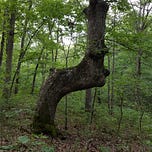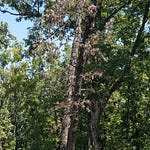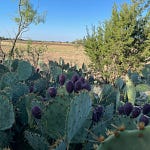An oasis is a pleasant place amid a difficult situation. In the desert, an oasis has shade and water for the weary traveler. Such an unexpected sanctuary is a welcome refuge when trudging though the wilderness. Last week I found an unlikely oasis on my journey across the country via air travel. Like an exhausted wanderer in the desert, I embraced unexpected sanctuary when stuck in Chicago.
Note about the image. This picture was definitely not taken in Chicago, least of all the airport.
My Mysterious Mind
The alternate title for this post is “How to turn a 5-hour layover into 19,” which doesn’t sound like something anyone would want to do. Being stuck in one spot for five hours seems bad enough; nineteen hours of stalled travel is much worse.
Or is it? Let me explain what happened last Monday on my way to Baltimore airport. My journey started at Springfield airport where the gate agent for my flight to Charlotte offered to switch me to a shorter layover through Chicago. Instead of five-plus hours I would only have a two-hour layover, arriving way ahead of schedule. The flight would leave sooner than the one for which I was booked, adding even more time to my stay on the East Coast. “Great!” I thought. “Can you switch my bag, too?” The gate agent assured me she would call down to baggage and have them retag my bag, so it would travel with me.
As I sat at the new gate I thought about the nice comments I would leave as feedback for my trip, naming the gate agent who took the initiative to offer a better itinerary. I also called my daughter so she would know to pick me up four hours earlier than previously planned. We were both excited to have more time together.
The flight to Chicago was uneventful. When I turned off airplane mode on my phone after landing there were no alerts from the airline. Upon entering the terminal, I checked the gate information for my next flight. CANCELLED. I stared in disbelief, then joined over two dozen people in the slow-moving Customer Service line. I also texted my daughter so she knew I would have a change of plans. Plus a quick, unfruitful, check of the Departures list to see if I could quickly get to Charlotte and catch my original flight to Baltimore.
While waiting, I called Customer Service. A very nice man explained that the East Coast was getting slammed by severe storms. Many flights were cancelled, mine among them. The earliest I could get anywhere near my original destination would be the next afternoon, and then only if I flew to Charlotte early in the morning and then to DC airport. I accepted the switch but stayed in the line, hoping for something better.
My additional hour in line was rewarded with a better itinerary. I could fly directly to DC airport from Chicago the next afternoon. Plus, I was given a hotel voucher and a meal voucher. If there is a silver lining in my specific flight that was cancelled it was that it was not cancelled due to weather. Everyone else stuck at Chicago airport would have to pay for their hotel; mine was covered by the airline.
By this point I was “two-hours hungry” and took my $12 food voucher to the closest airport restaurant. I chose a small table in the corner, ordered a beverage and food, and pondered my situation. Here is what I wrote in my journal:
“I’m sitting here enjoying classic rock, currently ‘Stairway to Heaven.’ I have nowhere to go in a hurry – ironic because I’m at an airport where everyone is in a hurry. I’m sitting at a corner table with a view of the entire restaurant. This is a good place, an unlikely oasis. Not home. Not where I was headed. My hunger is satisfied. I’m in a good place. This isn’t where I expected to be, but it’s a good place. My unlikely oasis. I’m at a hospital for the weary.
Now ELO is playing. I can be in a completely wonderful place even when delayed at the Chicago airport. Thank You, Lord, for this unexpected oasis. I’m in a place of hurry but I’m not in a hurry to go. My flight is tomorrow afternoon. I’m healing here, not just from a flight cancellation but from a complex season of job changing. I get it, Lord. Thank You for bringing me here.”
The rest of the story, which includes lost baggage, two train trips, and sleeping in different places for five nights in a row, will have to wait until next week’s post. For now, what is your story? What is your experience with interruptions and detours? Do you find frustration and anxiety when off your planned route? How can you find an unlikely oasis instead, embracing unexpected sanctuary?
Message of Mystery Acres
Our property, previously sacred land for the Osage people, has inspired me to learn more about its historic inhabitants. I took a book about Osage traditions with me for that five-hour layover that became an overnight stay at a hotel near Chicago airport. A deeply spiritual people, the Osage have much to teach about finding peace in unlikely places.
The Osage ceremonial name for the earth is Ho e ka, which means snare or trap (Burns, 1984). The earth is viewed as a trap into which all life falls, ensnared until escaping through death. The soul of a person moves from the invisible into the visible through birth, returning to the invisible in death. Earthly life is viewed as a time of struggle for the Osage while they serve as custodians for the land and all created things.
“In Osage myths, the emphasis is on the relationship of the people with the many manifestations of the Mysterious Being of the Universe” (Burns, 1984, p. 177). To the Osage, “man is a part of nature and must live with nature” (p. 178). They used “life symbols” drawn from nature to use as models for how to live. For example, the Little Rock of the Marsh is a life symbol and can teach a way to live. “When one considers the durability and peacefulness of stone, and the stoic acceptance of what comes its way,” the Osage way of thinking about how to live emerges (p. 177). Living with nature, for the Osage, means meditating on a seemingly mundane object, such as a rock, made by the Great Creator (Burns, 1984).
The message of Mystery Acres is a testimony from the indigenous people who once lived there. A detour or interruption isn’t the only time we might feel trapped somewhere we don’t think we belong; the Osage viewed all of life on earth in human bodies as a trap. For the Osage, life symbols found in nature provided a model for how to live peacefully while trapped. Mystery Acres has abundant rocks of various sizes and shapes. To be a rock is to “live” peacefully surrendered, accepting of its powerlessness to improve or change its circumstances. I wouldn’t want to continuously live in this manner, choosing instead to adjust what I can to make life for myself and others better, but being able to find peace when stuck, like a rock, might be better than thrashing about like a rabbit caught in a trap.
Ancient Mystery’s Voice
“They traveled on to an oasis called Elim, where there were 12 freshwater springs and 70 palm trees. They camped there by the waters.” (see Exodus 15:27)
The word “oasis” doesn’t appear at all in most translations of the Bible. In contrast, the word “wilderness” appears 164 times across the ancient texts. One verse is occasionally translated to include the word “oasis” as attached to a place named Elim. This verse has a straightforward translation; an unlikely place provided a source of refreshment for the people of Israel because it had “twelve freshwater springs and seventy palm trees.” No surprise – the people set up camp there.
Scrolling out for the big picture, we see a view of life’s travels as being more times of wilderness than of oasis. Even adding the word “refuge” to our consideration only adds 98 additional references. The word “sanctuary” tops the list with 170 uses in the New International Version. Taken together, however, the inescapable conclusion is that life is hard, like a wilderness, and surviving the journey requires places of oasis, refuge, and sanctuary.
The people of Israel, traveling in ancient times as they escaped enslavement in Egypt, found relief at Elim along the way to the promised land. This place of incredible and unlikely abundance offered refreshment in water and presumably food (from the trees which were probably date palms). Their response to finding this oasis? They stopped and camped there by the waters.
Ancient Mystery’s Voice invites us to places of unlikely refreshment in our wanderings through life’s wilderness. When we find such an oasis as Elim, it’s time to pause for rejuvenation. Embracing unexpected sanctuary means camping by the waters of an unlikely oasis, especially in times of difficulty.
Living in Mystery
What does it mean to live in the mystery of resting in an unlikely oasis, embracing unexpected sanctuary? First, it means recognizing that life is often a journey through an uncharted territory. We make plans, and we should, but frequently those plans are disrupted, delayed, or cancelled. Then what? When plans don’t proceed, well, as planned, the temptation is to fret with frustration. The alternative is to look around for an oasis, albeit an unlikely one.
This starts by asking yourself, “How might this unexpected place I find myself be good?” For me, being forced to pause in Chicago was a break I must have needed. I was trapped, in a sense, in Chicago, en route to visit some of my children and grandchildren. Typically, a slave to my “to do list,” I had nowhere to go and nothing to do. Being a prisoner in Chicago also meant I was set free. I found an unlikely oasis and embraced the unexpected sanctuary I found when forced to stop wandering around the wilderness.
The lessons of unlikely oasis also come from pondering a rock, like the meditations of the Osage people and the Little Rock of the Marsh. Peace can be found from acceptance of one’s current circumstances, relaxing in the strength of surrender when escape isn’t possible or wise. The rock doesn’t feel anxiety, frustration, or anger; we, too, can rest even when we have no power to change where we are.
If we find an oasis on our journey through a time of difficulty, we can take that as a sign to stop for a while, enjoying a time of refreshment. Like the ancient people of Israel who found Elim, we can “set up camp” and pause from our trudging. The lesson of oasis reminds us to find a pattern in our daily wanderings to include times of resting.
No matter what shifts or cancellations happen in life, there are places of unlikely oasis available. Rather than cursing an interruption or delay, trying saying, “This could be good.” I found improbable renewal in an airport restaurant during an unplanned overnight layover. Open your eyes to the possibilities of refreshment, seeking and embracing unexpected sanctuary.
Connecting with Mystery
Dear Lord of All Mystery, I confess to sometimes fighting the paths You are providing for me to unlikely places of oasis. Help me to watch for Your hand at work when my path is interrupted, my plans cancelled, or my journey is delayed. Open my eyes to the possibility of sanctuary in unexpected places. Thank You for places of unlikely oasis in the wilderness of my life. Amen.
Notes from Dr. Mac
If you want to do your own investigation of any of the scriptures I use, I suggest you go to Bible Gateway. This free online version of the Bible allows a search of words or phrases in various translations. I encourage you to ponder Exodus 15 verse 27 and look for places of unlikely oasis in your wilderness journey.
Do you want more from my writing? I have three years of previous posts, which you can find at my ARCHIVE.
My very first post, from May 8, 2022, is Turn the Page. I have topically organized some of my previous work in the My Books section. Plus Mystery’s Voice is on Spotify.
Do you know someone who might enjoy receiving Mystery’s Voice? You can subscribe a friend or family member for free by adding an email address to my mailing list via the Subscribe button below.
I want to know what you’re thinking! You can email me at: Dear Dr. Mac or leave/send a message (see below). I love hearing from you!
Reference
Burns, L. F. (1984). Osage Indian customs and myths. The University of Alabama Press.













